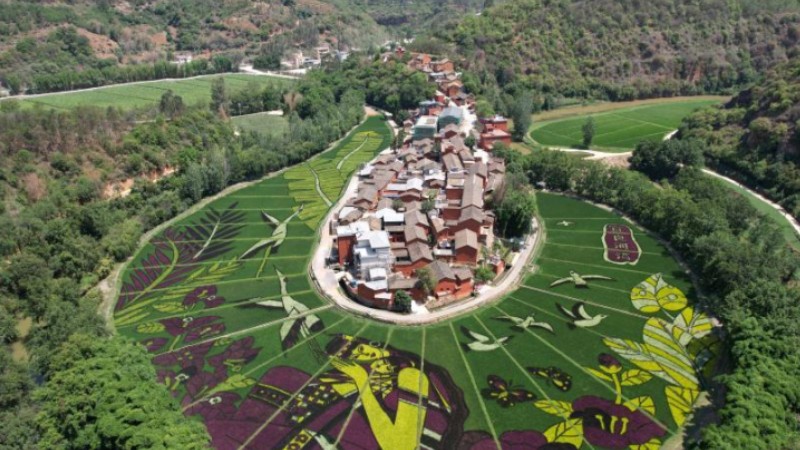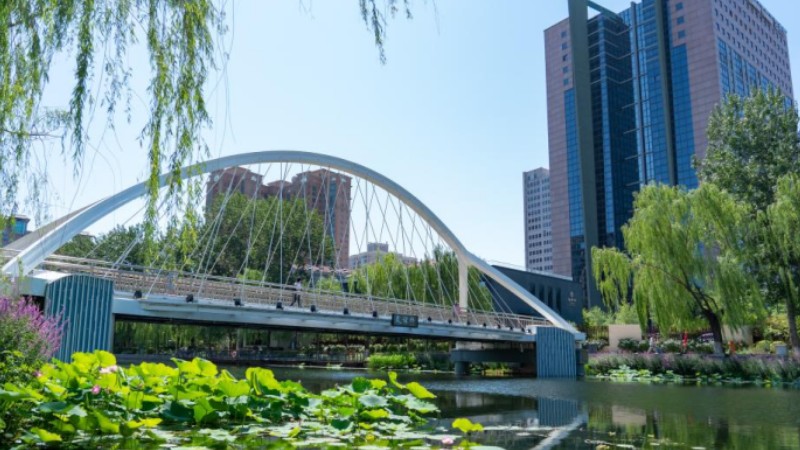One year on, Xinjiang's desert rail loop brings convenience, prosperity
URUMQI, July 19 (Xinhua) -- As student Abdulrehim Abduleli moved toward the hometown of his childhood role model, he was filled with excitement, looking expectantly out of the train window and checking his watch from time to time.
The boy's role model, Kurban Tulum, was a resident of Yutian County, Hotan Prefecture, in northwest China's Xinjiang Uygur Autonomous Region. The Uygur farmer is well-known for his role in promoting ethnic solidarity. Although he passed away in 1975, his story lives on.
"Since childhood, we were aware that Kurban Tulum had tried to ride a donkey from Xinjiang to Beijing. Now, we can take this clean and convenient train to his hometown," said 13-year-old Abdulrehim Abduleli, a resident of Hotan's Moyu County, some 200 km from Yutian. He was joined on his trip by over 30 students.
The boy was able to make this dream journey thanks to the 2,712-km rail loop encircling the Taklimakan, China's largest desert. Launched in June 2022, it is the world's first desert loop railway line.
The loop links major cities including Aksu, Kashgar, Hotan and Korla, and has put the development of Xinjiang, especially its southern part, on a faster track.
CONVENIENCE, DEVELOPMENT
Located in southern Xinjiang, Hotan is well-known, among other things, for its top-notch, mouthwatering fruits, and yet for a long time it lagged behind on development. Now things are improving, especially with the launch of the desert railway.
"By this special train, walnuts will be transported to our customers quickly," said Rozimamat Nuri, general manager of Kelaimu Agricultural Product Company of Hotan County, adding that he expects to sell over 40,000 tonnes of walnuts this year.
According to China Railway Urumqi Group Co., Ltd., as of mid-June, a total of nearly 33.5 million tonnes of goods had been delivered through the freight transportation centers in the cities of Korla and Kashgar, thanks to the loop railway.
Industrial agglomeration has also been accelerated. The railway station of Qira County in Hotan Prefecture, a node of the loop, was also launched last year. Not far from the station is the Tianjin industrial park, where textiles and electronics enterprises are busy making products, while the main building of a regional logistics distribution center has been erected.
"We have started to build a logistics center in the area surrounding the station. Locally produced goods and other southern Xinjiang products can be delivered to the Kashgar economic development zone by railway, to better link with the Central Asian market in the future," said Ma Jiangshan, a major official with Qira County.
According to Xinjiang's transport authorities, the autonomous region has over 220,000 km of highway, nearly 8,770 km of railway in operation and 25 civil transport airports.
The fast-track development of Xinjiang's traffic infrastructure impressed Abdulrehim Abduleli. The boy said that, when he goes to university, he hopes to study a major linked to transportation. "I want to build high-speed railways in southern Xinjiang in the future," he said.
BOOMING TOURISM
The desert rail loop has not only brought convenience and opportunities to residents living nearby, but has also given tourists an opportunity to learn more about Xinjiang.
In Ruoqiang County, Bayingolin Mongolian Autonomous Prefecture, people from various ethnic groups perform Muqam, a traditional art form of the Uygur ethnic group integrating song, dance, and folk and classical music, while tourists applaud or dance along with the melody.
"We are much busier this year," said Ershidin Tursun, head of the Loulan Art Troupe of Ruoqiang County. "Sometimes we even have to add temporary performances or rehearse a newly developed dance drama to meet the demand from tourists."
For Hasyetikhan Matursun, a guide at the Kurban Tulum memorial hall, the ongoing summer vacation is indeed a busy one. But she enjoys the buzz of activity.
"Sometimes we are very busy, but we are happy that more people are coming here and learning about Kurban Tulum's deeds," she said.
Xinjiang saw a rebound in the tourism sector this year. During the first half of 2023, the region received more than 102 million tourist trips, up 31.49 percent year on year, said the regional culture and tourism department.
Among the experiences that tourists really enjoy is the local cuisine, including traditional baked buns stuffed with meat and sometimes vegetables, a typical delicacy of Xinjiang.
In a baked bun restaurant in Hotan City, a waiter demonstrates how to enjoy the buns by cutting away the tough flat side to reveal the steaming contents. Diners take photos and share them with friends via social media.
"The baked buns in Xinjiang are large and they have a fragrant aroma," said tourist Fan Fei, adding that they are similar to the pineapple buns in her hometown of Guangdong Province, one of the country's economic powerhouses.
The rail loop is also convenient for people living near the desert who wish to travel outside Xinjiang. This year, a batch of students from the middle school of Ruoqiang County took the railway to Urumqi, where there is an abundance of airlines, then caught a plane to Shanghai, according to Feng Haiyan, who works with the school.
"Traveling by train is affordable and convenient. Our students went to Shanghai Jiao Tong University and Fudan University, and experienced artificial intelligence and engaged in assembling robots in an innovative factory," said Feng.
Photos
Related Stories
- NW China's Burqin County becomes popular destination
- Scenery of Altun Mountains National Nature Reserve in NW China's Xinjiang
- Lavender planting bases promote local tourism and lavender processing industry in NW China
- Tibetan antelopes enter peak season of reproducing in Xinjiang Altun Mountains National Nature Reserve
- In pics: Summer harvest underway in NW China's Xinjiang
Copyright © 2023 People's Daily Online. All Rights Reserved.









